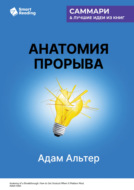Kitobni o'qish: «Summary: Chatter. The Voice in Our Head, Why It Matters, and How to Harness It. Ethan Kross»
Автор:
Ethan Kross
Оригинальное название:
Chatter. The Voice in Our Head, Why It Matters, and How to Harness It
www.smartreading.ru
How Our Mind Works
Where Is the Source of Our Inner Voice
One third to one half of our waking hours we spend living everywhere but in the present. Every now and again our brain uploads memories and puzzles us with imagined scenarios, attacks us with worries, and forces us to imagine the future, both near and far. And all this mind activity is accompanied by endless thinking. The voice in our head gives us advice, warns, threatens, bothers us, and we begin thinking about past arguments or those that have yet to occur. All this is really tiring, even exhausting. So much so that you want to force our inner interlocutor to shut up completely, if not stay quiet at least for a while. But these thoughts come to mind anyway, sometimes in droves. We spend a huge part of our life… in our own mind!
You, of course, won’t be able to stop all this chatter. And the good news is you don’t have to. Our mind’s ability to wander about, peeking both into the past and future, is a huge evolutional advantage that allows people to teach and learn, to tell stories, plan, dream, and avoid danger. Fortunately, nature has also provided us ways of making our flow of thoughts much more efficient and balanced.
Let’s take a look at how our mind is organized. One of its most important parts is memory, which is the ability to accumulate, filter and store terabytes of information that allows us to navigate our way around in the world. How our memory operates is tightly connected with our language abilities. If we perceive information in audio and speech format, our brain is able to retain it by talking things through with itself. Such a mechanism starts developing in early childhood. Language development occurs simultaneously with the emotional development: an example being how talking out loud helps small children develop self-control.
Parents and their interaction with children play an essential role in the maturing of a child’s inner voice. Whether they intend to or not, they teach their kids behavioral models and reactions to what surrounds them, including the verbal cues. As the inner voice grows stronger over the years it plays a key role in forming the self. By thinking about our desires, values, and needs we tell ourselves the story of our life.
With age we notice that our inner narrator is too chatty. Subconsciously we understand that these thoughts don’t always have much to do with reality, but we still are unable to resist an internal argument with that inner voice.
"I’m no good enough", "I’m afraid I won’t succeed", "What did she mean by that?" – such chatter is the preferred phrasing of our mental interlocutor.
Solomon’s Paradox
Such endless internal negotiations can obviously have the most negative effect on our attention span: they distract us. That’s why a distracted goalkeeper may let a ball pass under his legs or a nervous professor may lose his train of though during a lecture. Just like a PC freezes up when there is too much software running at the same time, the brain too underperforms when it’s overloaded with mental chatter.
What’s more, this chatter has no soothing effect whatsoever. On the contrary, it worsens our stress. When we replay in our minds over and over a hurtful conversation or an awkward occurrence, we get even angrier. Stress hormones get released into the blood and start poisoning our organism. This is not only a brings about emotional overstrain, but also weakens the immune system and exacerbates chronic diseases. The trap here is that such mental chatter is capable of completely capturing our attention and prevents us from taking a much needed broader look at the situation. With this being said, we are able to give fairly reasonable advice to others. As the saying goes, "it’s easy to bear the misfortunes of others." Ethan Kross calls this the Solomon’s Paradox.
The Hebrew King was renowned for his wise and weighted judgements of other people’s actions (that’s where the idiom "The judgement of Solomon" comes from). But in his private life he appeared to be considerably less farsighted. Solomon had seven wives including a few foreign ones. These brides over time persuaded the King to worship the gods of other lands, which eventually led to the downfall of Solomon’s Kingdom.
Most often we fail to keep the same life-saving emotional distance from events occurring in our own lives that we employ when we observe other people’s affairs. But herein lies the key to the solution: we need to look at ourselves from the outside looking in. Just how do we go about doing that?
Bepul matn qismi tugad.








